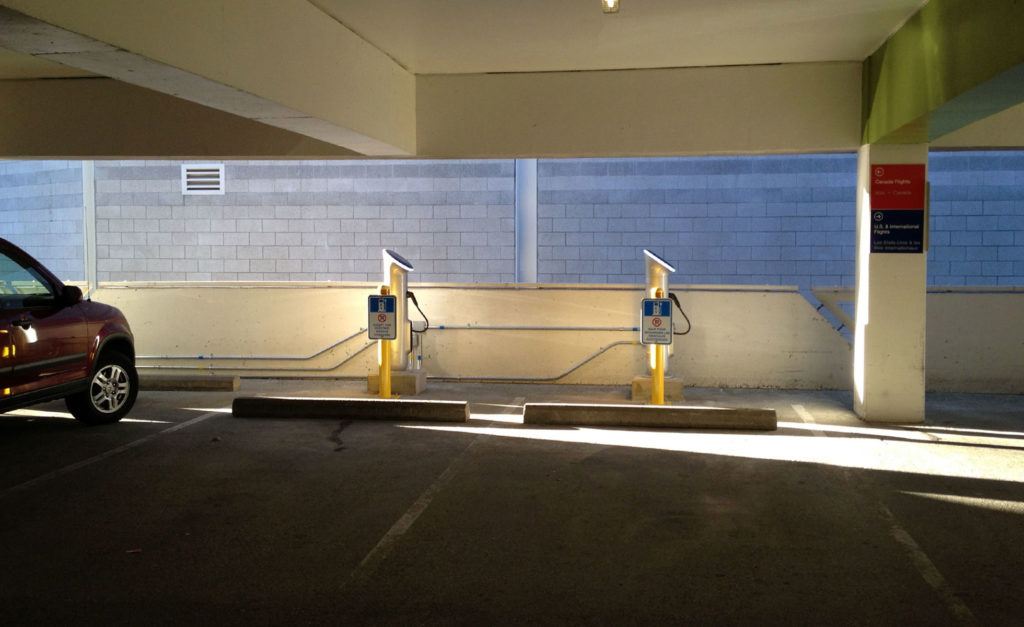
Electric vehicle charging stations at the Vancouver International Airport (YVR) parking lot. (Photo: Marcin Chady via Flickr)
What is a zero-emission vehicle mandate?
ZEV stands for zero-emission vehicle. A zero-emission vehicle does not release any emissions, including greenhouse gas emissions like carbon dioxide, but also other harmful chemicals and particulates. To keep it simple: we’re talking about electric cars.
A ZEV mandate is a target that the government sets, usually focused on the percentage of cars sold in a given year that are electric. The B.C. government set targets of 10 per cent electric by 2025, 30 per cent by 2030 and 100 per cent by 2040. These are mandatory targets that ramp up over time. The government also announced supportive measures such as expanding the charging network for electric cars and increasing the level of rebates given to consumers when they buy an electric car.
Will my next car (or truck) be electric?
The possibility of owning or driving electric vehicles is exciting. Around the world in countries such as India, France, Britain and Norway, targets have been set to eliminate the sale of gasoline and diesel vehicles by 2025 to 2040. That’s right around the corner.
It’s becoming more likely that someone you know is the proud new owner of an electric car. Over the next five to 10 years in particular, B.C. initiatives will focus on increasing vehicle choice for consumers and driving down electric vehicle costs. Electric vehicles are popular, but there aren’t enough available at dealers or in communities across the province. While public charging infrastructure is expanding rapidly, government needs to make personal at-home charging for new electric car owners easier. Many potential electric car owners who rent or need shared space can’t accommodate personal chargers. The more the government does to facilitate charging infrastructure, both personal and public (like on city streets), the easier it becomes for people to own and charge their electric car.
Electric vehicles are still too expensive for many, but lower-priced used-car options are becoming more common. B.C. will continue to offer incentives — typically about $6,000 per vehicle — to reduce the initial cost of buying an electric vehicle.
As electric vehicle costs come down, more vehicle choices will be available. Charging will get easier and more people will start choosing electric over outdated fossil fuel vehicles. This is a win for those of us who need a vehicle and can’t rely on active transportation or transit.
Will this help the environment?
Transportation accounts for about 40 per cent of B.C.’s climate change emissions. Personal vehicles make up about 14 per cent of total emissions. Reducing personal vehicle emissions is one of the most important ways to reduce overall emissions from this heavily emitting sector.
While a ZEV mandate is a positive incentive for those who need to use personal vehicles, it doesn’t replace the need for more of us to choose active transportation (like bikes and walking) and transit to reduce transportation emissions. Research shows that ZEV mandates are one of the most effective tools to put power in consumers’ hands.
How does the ZEV mandate fit with the other things the government is doing?
The ZEV mandate is one of the strongest initiatives in the new B.C. climate plan, along with transportation investments, regulations and pricing to reduce fugitive methane emissions from the upstream oil and gas sector. B.C. and Quebec are leading the country in integrating electric vehicles. B.C.’s mandate provides a template for the rest of Canada and is consistent with recommendations the David Suzuki Foundation supports. A national ZEV mandate was promised for 2018. B.C.’s mandate should help make that stronger.
There’s still much work to do. Heavy vehicle emissions also have to be reduced and B.C. needs initiatives to address these emissions and ensure strategies are complementary.
Check this guide to see if electric vehicles are right for you.
Has Canada stalled on electric vehicles? Take action!
Our work
Always grounded in sound evidence, the David Suzuki Foundation empowers people to take action in their communities on the environmental challenges we collectively face.



